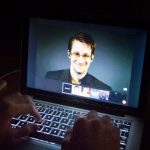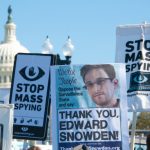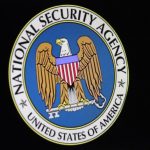The Intercept cracks open the Snowden archive including internal NSA newsletters

There can be few people who have had such an impact on people's perception of the government as Edward Snowden. Having exposed the convert spying activities of the NSA, he opened up a worldwide debate about privacy and surveillance that is still going on today. His revelations have shaped public opinion and changed the course of history.
Just as the likes of the Guardian have already helped to educate the world about what the NSA has been doing, so The Intercept is releasing a huge cache of internal NSA documents that give an intriguing insight into the agency's operations. The documents shed light on the NSA's work relating to terrorism, Iraq, and general surveillance.
Snowden: I couldn’t trust Microsoft so I used free software like Tor, Tails and Debian

At the Free Software Foundation's LibrePlanet 2016 conference, Edward Snowden credited free software with enabling him to blow the whistle about government surveillance. Speaking via video link from Russia, the former NSA contractor said that "what happened in 2013 couldn't have happened without free software".
But as well as indicating his preference for free, open source software, Snowden revealed that he refused to use Microsoft software because he "couldn't be sure" that there weren't backdoors built in.
Fighting censorship: Edward Snowden, Amnesty International, AdBlock and Pussy Riot

Online advertising is incredibly divisive, and for World Day Against Cyber Censorship, AdBlock is opting to replace banner ads that would normally be blocked with links to Amnesty International. The human rights group is fronting an anti-cyber-censorship campaign, joined by Edward Snowden, Pussy Riot (famous for rubbing up Russia's President Putin the wrong way) and Ai Weiwei.
The aim of the campaign is to promote freedom of speech online but highlighting examples of free speech being censored -- not just in obvious places like China and North Korea, but also the United States and the United Kingdom. Government control of the internet is something that many think is restricted to limiting what journalists are able to publish online, but as the campaign highlights it's a problem that can affect anyone.
The FBI wants you to think Apple is a terrorist sympathizer

Speaking at the Common Cause Blueprint for a Great Democracy conference in Moscow via video link, Edward Snowden gave tech writers around the world an excuse to swear in headlines. Dismissing the FBI's claims as 'bullshit', the former NSA contractor says that Apple's involvement is not needed for the law enforcement agency to unlock the San Bernardino shooter's iPhone.
Snowden is not alone in decrying the demands being made by the FBI that Apple should create custom firmware to allow it to bypass the lock screen of the iPhone at the center of the terrorism case. He's one of a growing band of people convinced that the FBI is using the San Bernardino as a PR exercise. Apple has been criticized for being unhelpful, but more than this, the FBI is painting a picture that shows Apple as a terrorist sympathizer.
Big Brother's crystal ball: China developing software to monitor citizens and predict terrorist activity

We've become used to the idea of online surveillance thanks to Edward Snowden blowing the lid off the activities of the NSA and GCHQ. While it's easy and natural to bemoan the infringement of privacy such surveillance entails, no one ensures as limited and controlled an internet as the Chinese.
There's the famous Great Firewall of China for starters, and as part of a counter-terrorism program the country also passed a law requiring tech companies to provide access to encryption keys. Now the Communist Party has ordered one of its defense contractors to develop software that uses big data to predict terrorist activity.
EFF pushes forward with new amicus brief in case against NSA spying

At this point it almost feels like we've been living with the Edward Snowden revelations all of our lives. While what was revealed scared many people, it also led to a lot of legal battles that are still raging on. At the forefront of those is the Electronic Frontier Foundation, a group that tirelessly fights for people's rights.
The foundation has had an ongoing case which has been termed Jewell v NSA, as well as Wikimedia v NSA. There are many irons in the fire in this battle and now the EFF has filed a new amicus brief in the Wikimedia case.
Julian Assange can't be allowed to hide behind the skirts of WikiLeaks to avoid answering rape allegations

Like Edward Snowden, Julian Assange is an incredibly divisive character. Just as Snowden is viewed by some as a hero for exposing the activities of the NSA, so Assange is viewed as a hero for exposing -- amongst other things -- the darker side of the US military through WikiLeaks. But both figures are also viewed as villains by those who believe that their whistleblowing has endangered national security.
While Snowden scampered off to Russia to avoid the US legal system, Assange took refuge in the Ecuadorian embassy in London. While it's certainly true that he's a man of interest for the US which ultimately seeks to prosecute him over the activities of WikiLeaks, Assange is actually holed up in the UK to escape extradition to Sweden where he faces questioning over allegations of rape. He has continually used the additional prospect of extradition to the US for WikiLeaks-related questioning as an excuse for not facing the music in Sweden. This is just about as wrong as it's possible to be.
Privacy ombudsman could handle European complaints about US surveillance

The importance and awareness of online privacy issues have been brought into sharp focus in the 21st century. It's not entirely down to Edward Snowden, but the revelations from the former NSA contractor are a constant reference point for those concerned with privacy, security and freedom of speech.
One of the greatest problems facing anyone trying to tackle the problem of privacy on the web is dealing with the ideologies of different countries, and how this affects data sharing. A level of surveillance that is deemed acceptable in the US, for instance, may be considered completely objectionable in another. The latest suggestion to help overcome this seemingly insurmountable problem is to set up a privacy ombudsman that would be able to handle European complaints and queries about US surveillance.
Kim Dotcom faces extradition to US from New Zealand

Kim Dotcom, the founder of MegaUpload and Mega, could be extradited to the US where he faces charges of copyright infringement. Dotcom is also wanted by US authorities for money laundering and racketeering, and a New Zealand court has ruled that his extradition can go ahead.
The German national's Auckland home was raided by New Zealand police four years ago after the FBI closed down his file-sharing site in the US because it had been used to illegally share music and movies. Kim Dotcom has proved to be a polarizing character -- much like Edward Snowden -- viewed by some as a spokesperson for a free internet, and as an out and out villain by others.
GCHQ accused of "persistent" illegal computer hacking

Court documents released during a court case brought by Privacy International show that GCHQ -- the UK version of the NSA -- has engaged in "persistent" illegal hacking. The targets of the intelligence agency's surveillance include computers and phones around the world without the need for individual warrants.
There is concern about the use of "thematic warrants" which allows GCHQ to hack computers with very little justification or oversight, and with very broad remits. Privacy International is involved because there are clear privacy issues involved in GCHQ's activities, and it is seen as being of greater importance than ever with renewed interest in the Investigatory Powers Bill.
NSA stops bulk collection of phone metadata

The NSA's bulk surveillance and collection of phone data has come to an end. President Obama announced that the current surveillance program would stop by 11:59 pm EST Saturday, but this does not mean that phone surveillance has completely disappeared.
Instead of wide scale dredging of data, the NSA will now engage in more targeted surveillance programs -- something that privacy advocates have been calling for for some time. The scaling back of surveillance has not come out of the blue; it's became of a legal requirement earlier in the year that has now been implemented two and half years after Edward Snowden blew the whistle on NSA spying.
Is Yahoo locking you out of your email account for using an ad blocker?

Yahoo has sparked controversy by preventing some users from accessing their email accounts if they have an ad blocker installed. It's something that seems to be restricted to the US at the moment, and Yahoo says it is testing out the block on a "small number of Yahoo Mail users".
Edward Snowden recently said that people have a duty to use an ad blocker, and it seems that nearly 20 percent of web users have followed his advice. Just like Google, Yahoo makes a large proportion of its income through advertising, but affected Yahoo Mail users feel that the company is holding their email accounts to ransom.
Most smartphone owners fear hackers, thieves and government control

Edward Snowden's NSA and GCHQ revelations seem to be unending. One of his more recent disclosures was that UK intelligence agencies had the ability hack and remotely control any smartphone.
A survey by Broadband Genie shows that smartphone owners are more than a little concerned about this, with more than half (55 percent) saying the possibility of remote control worries them. A similar number (53 percent) express concern that these surveillance and control powers are open to abuse, and nearly a quarter (24 percent) feel they are a breach of human rights.
We can't let governments use ISIS and Paris attacks as excuses to increase surveillance

The tragic events in France have, almost inevitably, led to renewed calls for increased surveillance of the internet. This cannot be allowed to happen; terrorism cannot be used as an excuse to infringe upon the privacy of millions of innocent internet users.
We have groups such as Anonymous taking a vigilante stance in a bid to drive ISIS from the internet, but governments have leapt on the massacres as a justification for additional snooping powers. This smacks very much of being a knee jerk reaction, and there is a very real danger that rushed legislation will cause greater harm than good.
Microsoft details four commitments to help rebuild trust in the cloud

In a lengthy, rambling blog post, Microsoft President Brad Smith explains how what has happened in relation to security over the past year is shaping the company's attitude to the cloud. He says that "it's time to rebuild the world's faith in the technology that empowers us all".
He takes a while to get to the point, meandering slowly around anecdotes about Windows 10, Edward Snowden, terrorist attacks in Paris, hacking, and governmental desires to weaken encryption. He says that these and other events "show it's crucial to have a conversation about worldwide information security".
Recent Headlines
Most Commented Stories
BetaNews, your source for breaking tech news, reviews, and in-depth reporting since 1998.
Regional iGaming Content
© 1998-2025 BetaNews, Inc. All Rights Reserved. About Us - Privacy Policy - Cookie Policy - Sitemap.